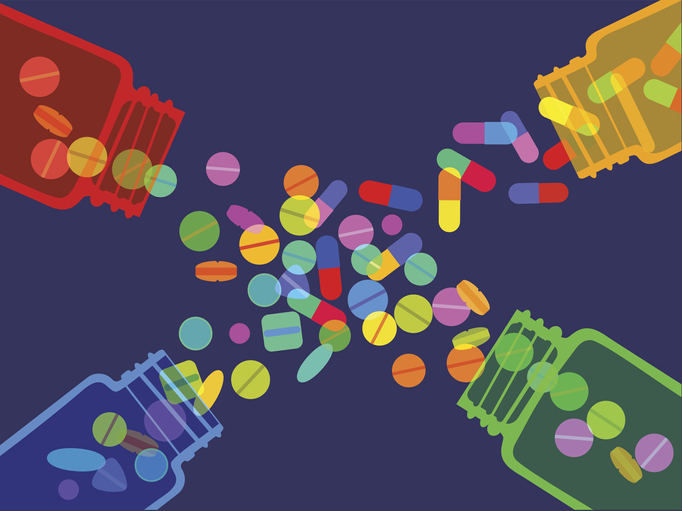Are You Chronically Overdosing on Supplements?

By Joy Stephenson-Laws, JD, Founder
According to recent data from the Council for Responsible Nutrition (CRN), 74 percent of U.S. adults take dietary supplements with 55 percent considered as “regular users.”
“Further analysis of the data reveals that people are using supplements not only to fill nutrition gaps they acknowledge persist, for example, when they can’t always eat the recommended servings of fruits and vegetables every day without fail, but to support their more active and healthy lifestyles and their aspiration for optimal wellness,” reports CRN.

Clearly, people’s intention when they supplement is to maintain or improve their overall health. The problem is that supplements are not always taken as they should be, and this can have serious, and even deadly, consequences.
I recently came across an article from Fox News about an 89-year-old man in the United Kingdom named David Mitchener who died last year due to hypercalcemia, a condition in which there is an excessively high level of calcium in the blood. This was caused by Mitchener ingesting way too much vitamin D in the form of a supplement.
Vitamin D and calcium are two very important micronutrients that work together.“Optimal vitamin D levels are necessary to increase the efficiency of calcium absorption. Without adequate vitamin D, the body absorbs no more than 10% to 15% of dietary calcium. In the vitamin D–sufficient state, the intestinal calcium absorption increases to 30% to 40%,” according to a report from the National Institutes of Health (NIH).
So it would make sense that consuming excessive vitamin D would cause higher than normal levels of calcium. A serious case of hypercalcemia can lead to kidney failure, an abnormal heart rhythm and even coma.
“Vitamin D toxicity was listed as one of the factors in Michener’s death, along with congestive heart failure, ischemic heart disease, chronic kidney failure and hypercalcemia,” according to the report from Fox News.
His vitamin D levels were at the “maximum recordable level.”
Chronic overdose of supplements.What particularly stood out to me about the case of David Mitchenern is that he had been taking a very high dose of vitamin D for at least nine months, possibly even longer, before he died.
"Often, a single large dose (50,000 to 150,000 IU, depending on the size of the individual) is well-tolerated, but chronic overdose can be much more dangerous," said Dr. Maryann Amirshahi, who was interviewed for the article published by Fox.
It's easier to overdose, even chronically, than we may think.
“Researchers looking at national survey data gathered between 1999 and 2014 found a 2.8% uptick in the number of people taking potentially unsafe amounts of vitamin D — that is, more than 4,000 international units (IU) per day, according to a research letter published in the June 20 issue of The Journal of the American Medical Association (JAMA),” according to a 2022 article from Harvard Health Publishing.
“And during the same time period there was nearly an 18% increase in the number of people taking 1,000 IU or more of vitamin D daily, which is also beyond the dose of 600 to 800 IU recommended for most people.”
There are several reasons why this may be, but misinformation, confusion and lack of regulation are all probable causes.
Not long ago, I blogged about another man who also overdosed on vitamin D.
(Vitamin D has gained a lot of popularity over the last couple of years - thanks to medical studies which suggest that vitamin D may help protect against acute respiratory infections).
This man also had hypercalcemia. Fortunately, he survived and did not have permanent kidney damage. He was definitely misinformed when he started taking the supplements (he was actually taking a cocktail of supplements along with the vitamin D) per the advice of a nutritional therapist. This is why you really have to make sure who you seek medical advice from is competent. I think asking a competent doctor is the best place to start.
Taking supplements can also be confusing, and it’s quite possible to misinterpret the instructions
“One common mistake is that some vitamin D prescriptions are dosed once a week, but people may accidentally take them daily, which can lead to toxicity, the doctor warned,” according to the report from Fox.
In the health and medical worlds, we talk a lot about the concern of people who are Boomers and older having a drug interaction. I think we also need to understand that supplement overdose can be just as big as an issue. It’s always a good idea to read the instructions and ask questions if you are confused. There is no such thing as asking too many questions when you visit the doctor.
pH must-reads:
- You Can Medicate, but You Need to Communicate
- Ask your doctor: 'Are supplements safe to take with my Rx?'
- Are your supplements a health benefit or health risk?
There are so many different brands of supplements readily available to us both online and in the stores, making it difficult to know which brands and companies are the most trustworthy. I highly recommend reading the article I referenced from Fox. Some key points regarding supplements that I found quite honestly just shocking and unacceptable were:
- Research has shown people have gotten vitamin D toxicity from supplements that contained excessive amounts of this nutrient due to “manufacturing errors.”
- The manufacturer of the supplements can sell at any dose they want, and the manufacturer is not required to put a warning label for a high dose.
- Dose listed on labels is not always correct.
I am not saying all of this to scare people away from supplements. I am a big believer in supplementation. I just want people to understand that they must be proactive by knowing how to supplement safely.
So how do we supplement safely?

As always, a good place is to start with an informed medical professional. Always be communicative about all drugs you are taking. In the Fox article, one expert recommends only taking supplements that have been certified by United States Pharmacopeia (USP) or NSF International. Also look for supplements that have undergone third-party testing. To know how much vitamin D you should be getting based on age, sex and other factors, click here.
Never take more than the recommended dietary allowance (RDA) unless a competent healthcare practitioner tells you to do so. As always, routine nutrient testing is important because it will usually determine the nutrient imbalances or deficiencies you may have. Once this is determined, you can work with your doctor to get on a safe diet and supplement regimen.
Disclaimer: This article is not intended to provide medical advice. Please consult with your doctor or another competent healthcare practitioner to get specific medical advice for your situation.
The pH professional health care team includes recognized experts from a variety of health care and related disciplines, including physicians, attorneys, nutritionists, nurses, and certified fitness instructors. This team also includes the members of the pH Medical Advisory Board, which constantly monitors all pH programs, products, and services. To learn more about the pH Medical Advisory Board, click here.







